I have this query:
var smallExchangeReport = from ex in exchangeProgReport
where !string.IsNullOrEmpty(ex.comment)
group ex by new { ex.siteName } into g
select new SummuryReportTraffic
{
siteName = g.Key.siteName,
exchangeCounter = g.Where(x => x.Prog1ToProg2Check == 1).Count(),
descriptions = (from t in g
group t by new { t.comment, t.siteName } into grp
select new Description
{
title = grp.Key.comment,
numbers = grp.Select(x => x.comment).Count()
})
};
At some point I put it to the dataTable using foreach loop:
foreach (var item in smallExchangeReport)
{
dr = smrTable.NewRow();
foreach (var d in item.descriptions)
{
dr[d.title] = d.numbers;
}
smrTable.Rows.Add(dr);
}
But I need to put the LINQ result to dataTable without using foreach loop. So I made some changes to my code above according to this link:
DataTable dt = new DataTable();
DataRow dr = dt.NewRow();
IEnumerable<DataRow> smallExchangeReport = from ex in exchangeProgReport.AsEnumerable()
where !string.IsNullOrEmpty(ex.comment)
group ex by new { ex.siteName } into g
select new
{
siteName = g.Key.siteName,
exchangeCounter = g.Where(x => x.Prog1ToProg2Check == 1).Count(),
descriptions = (from t in g.AsEnumerable()
group t by new { t.comment, t.siteName } into grp
select new
{
title = grp.Key.comment,
numbers = grp.Select(x => x.comment).Count()
})
};
// Create a table from the query.
DataTable boundTable = smallExchangeReport.CopyToDataTable<DataRow>();
But on changed LINQ query I get this error:
Cannot implicitly convert type:'System.Collections.Generic.IEnumerable<<anonymous type: string siteName, int exchangeCounter>>' to
'System.Collections.Generic.IEnumerable<System.Data.DataRow>'. An explicit conversion exists (are you missing a cast?)
My question is how to cast the query to make it work?I tryed to cast to(DataRow) the result of the LINQ but it didn't worked.
